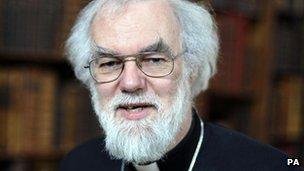Archbishop fears for Christians in Middle East
- Published

Dr Rowan Williams says some Christians in the Middle East are under "constant threat"
Christians in the Middle East are "more vulnerable" than they have been for centuries, the Archbishop of Canterbury has warned.
Dr Rowan Williams said that many Christians were leaving countries such as Iraq and Egypt in the face of persecution.
Many others had been forced to retreat to enclaves for their safety, he said.
Dr Williams added that the treatment of Christians would be the "litmus test" of the success of the Arab Spring.
The head of the world's Anglicans made his claims in the House of Lords.
He said: "At the present moment the position of Christians in the region is more vulnerable than it has been for centuries.
"The flow of Christian refugees from Iraq in the wake of constant threat and attack has left a dramatically depleted Christian population there."
Segregated
Those who chose to stay in the country had often withdrawn to segregated enclaves for their safety, he said.
The Archbishop says Coptic Christians living in Egypt are facing persecution
"Many recognise with heavy hearts things may come to such a pass that there are few, if any other options that will actually guarantee the safety of Christians there," the Archbishop said.
"But they still feel, surely rightly, that the creation of enclaves would be the yielding of a vitally important principle."
Besides Iraq, Dr Williams lamented the fact that many Coptic Christians were leaving Egypt, despite the faith having had a presence in the country for many centuries.
He said: "In a way that would have been unthinkable even a very few years ago, they are anxious about sharing the fate of other Christian communities that once seemed securely embedded in their setting."
Turning to the impact of the Arab Spring in the Middle East, Dr Williams said: "My contention has been that the security and wellbeing of the historic Christian communities in the region is something of a litmus test in relation to the wider issues of the political health of the region."
He added: "No-one is seeking a privileged position for Christians in the Middle East, nor should they be.
"But what we can say, and I firmly believe that most Muslims here and in many other places would agree entirely, is that the continued presence of Christians in the region is essential to the political and social health of the countries of the Middle East."